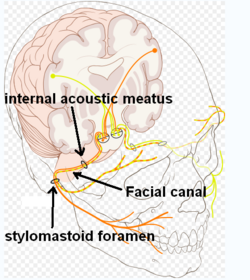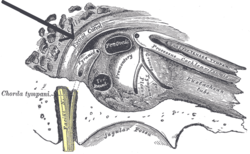Facial canal: Difference between revisions
Appearance
Content deleted Content added
m Citation maintenance. [Pu138]Formatted: pmid. You can use this bot yourself! Report bugs here. |
Adamlankford (talk | contribs) Dubious sentence. See Talk page. |
||
| Line 20: | Line 20: | ||
}} |
}} |
||
The '''facial canal''' (also known as '''Fallopian Canal'''<ref>{{cite journal |author="Rauchfuss, A.; Abing, W." |title=Fetal development of the tympanic part of the facial canal |journal=European archives of oto-rhino-laryngology |volume=243 |issue=6 |pages=374–377 |year=2005 |url=http://www.ncbi.nlm.nih.gov/pubmed/3566620}}</ref> -first described by [[Gabriele Falloppio]]-) is a Z-shaped canal running through the temporal bone from the [[internal acoustic meatus]] to the [[stylomastoid foramen]]. In humans it is approximately 3 centimeters long, which makes it the longest human osseous canal of a nerve <ref>{{cite journal |author=Weiglein AH |title=Postnatal development of the facial canal. An investigation based on cadaver dissections and computed tomography |journal=Surgical and Radiologic Anatomy |volume=18 |issue=2 |pages=115–23 |year=1996 |month=June |pmid=8782317 |doi=10.1007/BF01795229 |url= |accessdate=2009-01-27}}</ref>. It is located within the middle ear region, according to its shape it is divided into three main segments: the labyrinthine, the tympanic, and the mastoidal segment <ref>{{ cite journal | author="Einspieler, R., Weiglein, A., Anderhuber, W. and Jakse, R." | |
The '''facial canal''' (also known as '''Fallopian Canal'''<ref>{{cite journal |author="Rauchfuss, A.; Abing, W." |title=Fetal development of the tympanic part of the facial canal |journal=European archives of oto-rhino-laryngology |volume=243 |issue=6 |pages=374–377 |year=2005 |url=http://www.ncbi.nlm.nih.gov/pubmed/3566620}}</ref> -first described by [[Gabriele Falloppio]]-) is a Z-shaped canal running through the temporal bone from the [[internal acoustic meatus]] to the [[stylomastoid foramen]]. In humans it is approximately 3 centimeters long, which makes it the longest human osseous canal of a nerve <ref>{{cite journal |author=Weiglein AH |title=Postnatal development of the facial canal. An investigation based on cadaver dissections and computed tomography |journal=Surgical and Radiologic Anatomy |volume=18 |issue=2 |pages=115–23 |year=1996 |month=June |pmid=8782317 |doi=10.1007/BF01795229 |url= |accessdate=2009-01-27}}</ref>.{{dubious}} It is located within the middle ear region, according to its shape it is divided into three main segments: the labyrinthine, the tympanic, and the mastoidal segment <ref>{{ cite journal | author="Einspieler, R., Weiglein, A., Anderhuber, W. and Jakse, R." | |
||
title="Imaging of the facial canal by means of multiplanar angulated 2-D-high-resolution CT-reconstruction" |
title="Imaging of the facial canal by means of multiplanar angulated 2-D-high-resolution CT-reconstruction" |
||
| journal=Surgical and radiologic anatomy | volume=16 | issue=4 | pages=423–427 | year=1994 | url="http://www.ncbi.nlm.nih.gov/pubmed/7725200" | pmid=7725200}}</ref>. |
| journal=Surgical and radiologic anatomy | volume=16 | issue=4 | pages=423–427 | year=1994 | url="http://www.ncbi.nlm.nih.gov/pubmed/7725200" | pmid=7725200}}</ref>. |
||
Revision as of 23:50, 2 June 2010
| Facial canal | |
|---|---|
 Route of facial nerve, with facial canal labeled | |
 View of the inner wall of the tympanum. (Facial canal visible in upper left.) | |
| Details | |
| Identifiers | |
| Latin | canalis nervi facialis |
| TA98 | A02.1.06.009 |
| TA2 | 688 |
| FMA | 54952 |
| Anatomical terminology | |
The facial canal (also known as Fallopian Canal[1] -first described by Gabriele Falloppio-) is a Z-shaped canal running through the temporal bone from the internal acoustic meatus to the stylomastoid foramen. In humans it is approximately 3 centimeters long, which makes it the longest human osseous canal of a nerve [2].[dubious – discuss] It is located within the middle ear region, according to its shape it is divided into three main segments: the labyrinthine, the tympanic, and the mastoidal segment [3].
See also
References
- ^ "Rauchfuss, A.; Abing, W." (2005). "Fetal development of the tympanic part of the facial canal". European archives of oto-rhino-laryngology. 243 (6): 374–377.
{{cite journal}}: CS1 maint: multiple names: authors list (link) - ^ Weiglein AH (1996). "Postnatal development of the facial canal. An investigation based on cadaver dissections and computed tomography". Surgical and Radiologic Anatomy. 18 (2): 115–23. doi:10.1007/BF01795229. PMID 8782317.
{{cite journal}}:|access-date=requires|url=(help); Unknown parameter|month=ignored (help) - ^ "Einspieler, R., Weiglein, A., Anderhuber, W. and Jakse, R." (1994). ["http://www.ncbi.nlm.nih.gov/pubmed/7725200" ""Imaging of the facial canal by means of multiplanar angulated 2-D-high-resolution CT-reconstruction""]. Surgical and radiologic anatomy. 16 (4): 423–427. PMID 7725200.
{{cite journal}}: Check|url=value (help)CS1 maint: multiple names: authors list (link)
